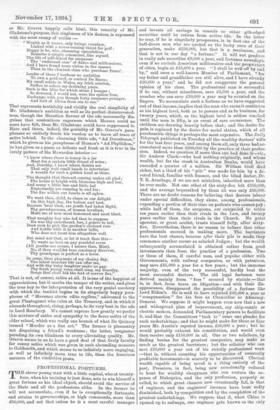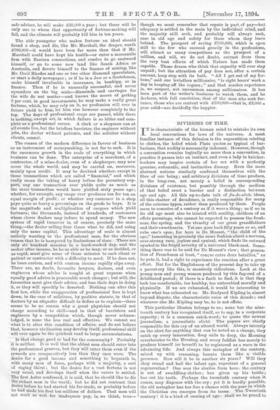PROFESSIONAL FORTUNES. T HE clever young man with a little capital,
who at twenty- four, when his training is just done, sets to win himself a great fortune as his ideal object, should avoid the service of the State and all the professions alike. In the former he will not accumulate, even if he is exceptionally fortunate, and attains to governorships, or high commands, more than £50,000, and not that unless he is a most careful manager and invests all savings in consols or other gilt-edged securities until he retiree from active life. In the latter he may, if he is singularly prosperous, is in fact one of the half-dozen men who are quoted as the lucky ones of their generation, make 2250,000, but that is a maximum, and that is not in our day "a fortune." It will not produce in really safe securities 28,000 a year, and forttuies nowadays, even if we exclude American millionaires and the proprietors of cities, begin at 215,000 a year. " I shall be well off by and by," said once a well-known Member of Parliament, "for my father and grandfather are still alive, and I have already £20,000 a year," and he did not exaggerate the general opinion of his class. The professional man is successful if he can, without miserliness, save £2,500 a year, and the number who can save £10,000 a year may be counted on the fingers. To accumulate such a fortune as we have suggested out of that income, implies that the man who earns it continues at his highest level, both as to powers and as to business, for twenty years, which, as the highest level is seldom reached until the man is fifty, is an event of rare occurrence. The children are drawing heavily before that ; and the desire for gain is replaced by the desire for social status, which of all purchasable things is perhaps the most expensive. The Daily Telegraph published on Tuesday all the wealthy doctors' wills for the last four years, and among them all, only three had ac- cumulated more than 2200,000 by the practice of their profes- sion. Indeed, we question if more than one had done it—viz., Sir Andrew Clark—who had nothing originally, and whose wealth, but for the crash in Australian Banks, would have exceeded a quarter of a million. Sir William Gull died richer, but a third of his " pile " was made for him by a de- voted friend, familiar with finance, and the blind doctor, Dr. T. R. Armitage, if we are not mistaken, inherited more than he ever made. Not one other of the sixty-five left 2150,000, and the average bequeathed by them all was only 250,000. There are no doubt reasons for believing that doctors labour under special difficulties, they alone, among professionals, expending a portion of their time on patients who cannot pay ; while half of them, the surgeons, are compelled to retire ten years earlier than their rivals in the Law, and twenty years earlier than their rivals itt the Church. No great operator, or great oculist, trusts himself fully, after sixty- five. Nevertheless, there is no reason to believe that other professionals succeed in making more. The banisters have the best chance, because after their pile is made, they commence another career as salaried Judges ; but the wealth subsequently accumulated is obtained rather from good investments than from the practice of a profession. Two or three of them, if careful men, and popular either with Governments, with railway companies, or with patentees, may save 215,000 a year for a few years; but the immense majority, even of the very successful, hardly beat the most successful doctors. The old legal fortunes were derived mainly from "fees " secured by statute — that is, in fact, from taxes on litigation— and with their dis- appearance, disappeared the possibility of a fortune like Lord Eldon's. He is said to have rejected £25,000 a year as " compensation " for his fees as Chancellor or Attorney- General. We suppose it might happen even now that a new and widespread plan of improvement, say ship-canals or electric motors, demanded Parliamentary powers to facilitate it, and that the Committees "took to" some one pleader for such undertakings ; and that he might make for three or four years Mr. Austin's reputed income, 240,000 a year ; but he would probably exhaust his constitution, and would even then receive only 2150,000 in all. One or two solicitors, by finding brains for the greatest companies, may make as much as the greatest barristers ; but the solicitor who can save 210,000 a year out of his strictly professional work —that is, without counting his opportunities of unusually profitable investment—is scarcely to be discovered. Clerical wealth capable of being saved is a thing entirely of the past, Premiers, in fact, being now occasionally reduced to hunt for wealthy clergymen who can sustain the ex- pense of Bishoprics, and the only profession, properly so called, to which great chances now occasionally fall, is that of engineer, and the engineers' incomes have been sadly diminished, both by competition and by the completion of the greatest undertakings. We suppose that if, when China is opened up to railways, one engineer gets known as the only
safe adviser, he will make 220,000 a year ; but there will be only one to whom that opportunity of fortune-making will fall, and the climate will probably kill him in ten years.
The able youngster who makes fortune an ideal should found a shop, and die, like Mr. Marshall, the draper, worth 2700,000—it would have been far more than that if Mr. Marshall could have kept his health—or enter a mercantile firm with Eastern connections, and resolve to go eastward himself, or go to some new land like South Africa or Australia, and devote himself to the finance of mining, like Mr. Cecil Rhodes and one or two other diamond speculators, or start a daily newspaper ; or if he is a Jew or a Scotohman, make himself invaluable in insurance, in banking, or in finance. Then if he is unusually successful, and never squanders on the big scale—diamonds and carriages for the wife do not matter—and knows the secret of getting 8 per cent, in good investments, he may make a really great, fortune, which, he may rely on it, no profession will ever in future yield to him, let him. rise however completely to the top. The days of professional coups are passed, while there is nothing, except art, in which failure is so bitter and com- plete as a professional career. A clerk or a shopman can at all events live, but the briefless barrister, the engineer without jobs, the doctor without patients, and the solicitor without clients, cannot.
The reason of the modern difference in favour of business as an instrument of moneymaking, is not far to seek. It is the enormous growth in the scale of everything in which business can be done. The enterprise of a merchant, of a contractor, of a mine-dealer, even of a shopkeeper, may now cover the whole world, and may be carried on, moreover, mainly upon credit. It may be doubted whether, except in those transactions which are called "financial," and which really mean the taking of heavy bribes for pecuniary sup- port, any one transaction ever yields quite as much as the same transaction would have yielded sixty years ago ; whether, for example, any cargo ever produces ton for ton an equal margin of profit ; or whether any customer in a shop pays quite so heavy a percentage on the goods he buys. It is the magnitude and multiplication of cargoes which yield fortunes; the thousands, instead of hundreds, of customers whom clever dealers may induce to spend money. The new system of rapid turnover is, of course, precisely the same thing,—the dealer selling four times what be did, and using only the same capital. This advantage of scale is almost entirely wanting to the professional man, for the obvious reason that he is hampered by limitations of time. There are only six hundred minutes in a hard-worked day, and the seeker after income, be he as able as he may, or as decided, or as rapid, must give some of those minutes to each client or patient or contractor with a difficulty to meet. If he does not, he loses custom, and with custom income rapidly slips away.
• There are, no doubt, favourite lawyers, doctors, and even engineers whose advice is sought at great expense when equally good advice is procurable much cheaper ; but still, the favourites must give their advice, and lose their days in doing it, or they will speedily be deserted. Nothing can alter this first law, while the exaggeration of professional fees is kept down, in the case of solicitors, by positive statute, in that of doctors by an etiquette difficult to define or to explain—there seems to be no reason why a great physician should not charge according to skill—and in that of barristers and engineers by a competition which, though never acknow- ledged, is none the less real and effective. We cannot see • what is to alter this condition of affairs, and do not believe that, however civilisation may develop itself, professional skill will ever again be the quickest road to large accumulations.
Is that change good or bad for the community ? Probably it is neither. It is well that the ablest men should enter into the professional grooves, but they will enter them even if the rewards are comparatively less than they once were. The desire for a good income and something to bequeath is, with many men of force, perhaps with a majority, a sort of raging thirst ; but the desire for a vast fortune is not very usual, and develops itself when the career is settled. The first Astor confessed, it is said, that he should like to die the richest man in the world; but he did not contract that desire before he had started his fur-trade, or probably before he had made his first ten millions of dollars. That men will not work so well for inadequate pay, is, we think, true—
though we must remember that repute is park of pay—but adequacy is settled in the main by the individual mind, and the majority still seek, and probably will always seek, ease in old age and safety for those whom they leave behind. The prospect of saving 2100,000, which is open still to the few who succeed greatly in the professions, will attract as many competitors as the prospect of a million, and will, we do not doubt, extract from them the very best efforts of which Nature has made them capable. Those dream who think that capacity will ever stay unpaid; but the attraction of pay does not, after a certain amount, keep step with its bulk. "All I get out of my for- tune," said one leviathan millionaire, "is eight hours' work a day in keeping off the rogues ;" and that sombre experience is, we suspect, not uncommon among millionaires, it has been part of the writer's business to watch them, and he declares, with full conviction, that of the men who seek for- tunes, those who are content with 2100,000—that is, 28,000 a year solid—are decidedly the happier.



















































 Previous page
Previous page